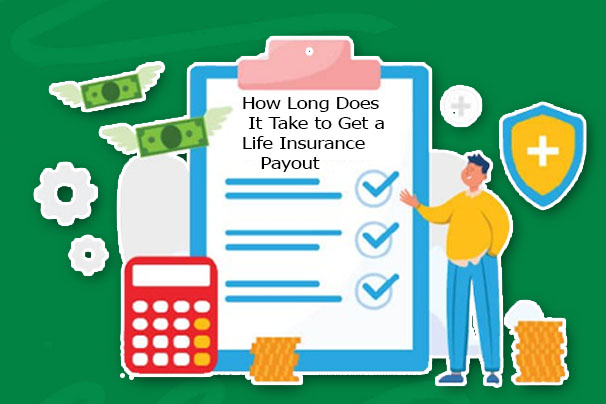How long does it take to get a life insurance payout? This is one question that beneficiaries of life insurance policyholders ask and are curious about. Undoubtedly, it can be quite overwhelming after losing a loved one, and one thing that a grieving family wants to experience is a lengthened life insurance payout.

This is why it is important to understand the timeframes and process of getting a life insurance payout. As it will help you relax during this daunting and difficult period. In this article, we will be exploring the details and intricacies of life insurance payouts. And how long it takes to get the payouts as a beneficiary.
What is a Life Insurance Payout?
A life insurance payout is the sum of money or amount that a life insurance provider. Or an insurer gives to the beneficiaries of a policyholder if and when they pass away. Furthermore, this payout is used to offer support financially to the beneficiaries or family of the insured.
What’s more, beneficiaries can use the payout for expenses like living expenses, funeral costs, and outstanding debts. Meanwhile, the terms and amount of the life insurance payout depend on the guidelines of the insurance company and the insurance policy’s specifics.
Who is Responsible for Filing a Life Insurance Death Claim?
The person who is usually responsible for filing a death claim for a life insurance payout is the beneficiary mentioned in the insurance policy. Thus, if the insured has a particular individual or entity stated as a beneficiary, they will be responsible for starting or beginning the claim process.
However, if the designated or mentioned beneficiary is not able to file a claim, the legal representative or executor of the insured’s estate might be given the task of filing the claim with the insurance company.
How Long Does It Take to Get a Life Insurance Payout?
Meanwhile, the timeframe to get or receive a life coverage payout from an insurance company can differ depending on various factors. Typically, after the beneficiary has filed a claim, it takes around a few weeks to several months to review and give the payout.
In the meantime, the standard time or period to get a life insurance payout is usually around 30 to 60 days. If additional documentation or investigation is required, this may take longer.
Factors That Can Delay a Life Insurance Payout
Several factors can affect the payout of life insurance. In other words, these factors are responsible for the possible delay in getting a life insurance payout as a beneficiary. They include:
- Policy verification.
- Incorrect or incomplete documentation.
- Fraudulent claims prevention
- Pending medical records.
- Claims disputes.
- Investigation for the cause of death.
- Exclusions.
- Policy lapse.
- Death during the contestability period.
How Is Life Insurance Paid Out to Beneficiaries?
Generally, life insurance payouts are disbursed to beneficiaries through any of these ways or means:
Installments
Over a particular period, the life coverage death benefit payout is paid in regular installments. Also, this will help prevent overspending and help handle large sums of money.
Lump-Sum Payment
This is the most common and most used method or means to disburse death benefits to beneficiaries. For lump-sum payments, the whole payout amount will be given to the beneficiaries in one payment.
Annuity
As for annuities, the benefits are converted to annuities, which gives beneficiaries regular payments for a fixed period, probably for life.
Retained Asset Account
Unlike lump sum payments, a retained asset account is the less common means for disbursing death benefits to beneficiaries. The insurance company will hold on to the insurance payout in an interest-bearing account, and beneficiaries can use checks to make withdrawals.
How To File a Life Insurance Claim
You must understand how to file a life insurance claim to prepare in advance to ensure that the claim process will be smooth when the time comes. Here is a comprehensive guide you can follow to file a life insurance death claim:
- Get the details of the policy.
- Reach out to the insurance company.
- Prepare the required documents.
- Wait for the claim to be approved.
- Receive the payout.
You must stay in contact with the insurance provider to keep track of your claim progress and present any additional documentation or information.
Tips for Receiving a Life Insurance Payout Quickly
Here are some helpful tips you can put into action if you want to speed up the life insurance payout process with the insurer:
- Present the correct paperwork.
- Ensure all documents and forms are filled out accurately.
- Provide all the necessary documents.
- File the life insurance claim immediately.
- Update the beneficiary information.
- Familiarize yourself with the policy.
- Contact a financial advisor.
If you want to reduce the time you will need to wait to get the death benefits of a life insurance policy, use these helpful strategies.
FAQs
What happens if the insurance company denies the claim?
If the insurance company denies your claim, you are meant to get a written explanation for the reason for the denial. Meanwhile, you can appeal the decision by seeking legal assistance or providing additional documentation or information.
Are life insurance payouts taxable?
In most cases, life insurance payouts are not taxable as income for the beneficiaries. However, if the payout is held onto as a form of investment or creates interest, the interest might be subject to tax.



